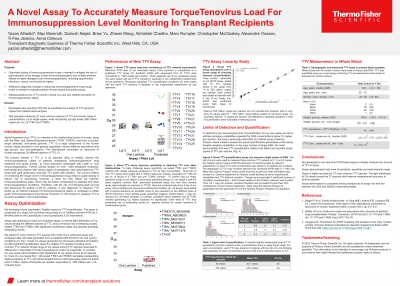A Novel Assay To Accurately Measure TorqueTenovirus Load For Immunosuppression Level Monitoring In Transplant Recipients
(P522) A novel assay to accurately measure TorqueTenovirus load for immunosuppression level monitoring in transplant recipients
Location: Platinum Ballroom

Poster Presenter(s)
Body: Optimized dosing of immunosuppressive drugs is needed to mitigate the risk of graft rejection at low dosage (under-immunosuppressed) and multiple adverse effects at higher dosages (over-immunosuppressed), including opportunistic infections, cancer, and toxicity to organs. Measuring immunosuppressive drug trough levels (e.g. tacrolimus) helps to monitor drug concentrations in blood, but does not fully reflect patient immunocompetence. Therefore, additional diagnostic testing is necessary to guide immunosuppressive dosing, with the aim of prolonging graft survival and improving patient quality of life. Based on multiple publications, new reliable biomarker for immunosuppression status is AlphaTorquetenovirus (TTV), a major non-pathogenic constituent of the human virome that is highly prevalent across different populations and age groups. The international committee on taxonomy of viruses recognizes 29 different species of TTV. Twenty clinical studies on over 1,000 transplant recipients, both adults and children with various types of transplants, have associated low TTV levels with graft dysfunction and high TTV levels with infection. However, no IVD-certified test to measure TTV is currently available in the United States.
We developed a new test based on real-time PCR to quantitate the number of TTV genomic copies from patient blood samples. Despite the highly polymorphic nature of the TTV genome, our assay accurately measures the most common 27 species of TTV with high precision. We conducted an analytical verification study for each of the 27 species of TTV, including accuracy and precision. We also confirmed our ability to measure TTV in EDTA blood samples from 40 donors (23 female and 17 male, median age of 39, age range is 22-70). Additionally, we confirmed the specificity of our assay by testing it against 280 million copies per reaction of select human Anelloviruses (TTMV, TTMDV), which share the highest sequence similarity with the TTV group, while maintaining single copy sensitivity for all 27 target TTV variants.
Conclusion: We developed a new qPCR assay that can accurately measure TTV in human blood with high level of specificity and precision.
We developed a new test based on real-time PCR to quantitate the number of TTV genomic copies from patient blood samples. Despite the highly polymorphic nature of the TTV genome, our assay accurately measures the most common 27 species of TTV with high precision. We conducted an analytical verification study for each of the 27 species of TTV, including accuracy and precision. We also confirmed our ability to measure TTV in EDTA blood samples from 40 donors (23 female and 17 male, median age of 39, age range is 22-70). Additionally, we confirmed the specificity of our assay by testing it against 280 million copies per reaction of select human Anelloviruses (TTMV, TTMDV), which share the highest sequence similarity with the TTV group, while maintaining single copy sensitivity for all 27 target TTV variants.
Conclusion: We developed a new qPCR assay that can accurately measure TTV in human blood with high level of specificity and precision.

